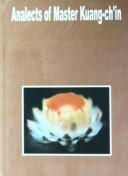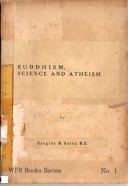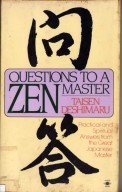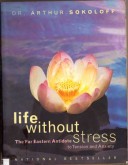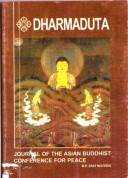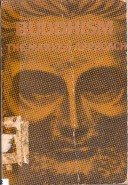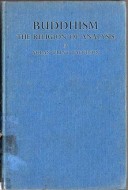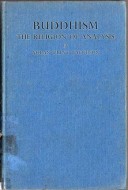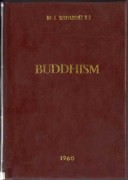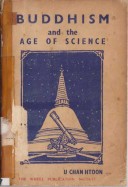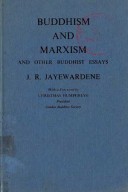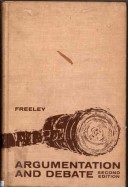Tìm Sách
Sách tiếng Anh-English >> Analects of Master Kuang-ch’in
Thông tin tra cứu
- Tên sách : Analects of Master Kuang-ch’in
- Tác giả : Master Kuang-ch’in
- Dịch giả : Su-Ya Chang
- Ngôn ngữ : Anh
- Số trang : 149
- Nhà xuất bản : Mu-ch’in Memorial Hall
- Năm xuất bản : 1998
- Phân loại : Sách tiếng Anh-English
- MCB : 1210000007202
- OPAC :
- Tóm tắt :
Master Kuang-ch’in (1892-1986) was born in Hui-an County of Fu-chien province in China. He was given up for adoption when he was four and was not educated, hence, illiterate.
He became a monk at the age of twenty-seven, but did not receive the formal bhiksu (monk) precepts until the age of forty-two. Mean-while, he practiced asceticism and recitation (of the name of Amitabha Buddha).
After receiving the full bhiksu precepts, he dwelled in a cave in the mountains where he practiced meditation alone for thirteen years and attained an elevated level. He came to Taiwan in 1947 and founded several monasteries, among them the Ch’eng-tien Temple of Taipei and Miao-tung Temple of Kao-hsiung. He had inspired a great many people into the dual practice of Zen and Pure Land doctrines.
CONTENTS
Preface………………………..vii
Translator’s Note………………………ix
- On Practice……………………….001
- On Keeping the Precepts……………………….063
- On Reciting the Name of the Buddha……………………….069
- On Reciting the Sutras……………………….091
- On the Sense of Self……………………….095
- On Calming the Mind……………………….101
- On Forbearance……………………….105
- On Gossiping……………………….111
- On Work Ethics……………………….117
- On Habitual Patterns……………………….127
- On a Simple Life……………………….131
- On the Foul Body……………………….139
- On the Pure Land……………………….145
PREFACE
It has been more than a decade since Master Kuang- ch’in left US. Many continued to benefit from his teachings, thanks to his widely circulated analects. To make it more accessible to an even larger readership, a pocket-size version was published about six years ago. At the same time, I committed myself to the project of launching an English version so that my late Master’s teachings can inspire Buddhists all over the world. While looking for a suitable translator, I first approached specialists at the foreign translation section of the United Daily News. They declined the task because, though the words are simple, the teachings of the Master are profound and by no means easy to convey in another language. While hosting a Buddhist summer camp for the children two years ago, I made the acquaintance of Dr. Amy R. Hwang of the Institute of Economies of the Academia Sinica. Dr. Hwang introduced me to Dr. Su-Ya Chang of the Institute of Modern History, also of the Academia Sinica, for the task. Professor Fei-chang Hwang of the English Department at the Chinese Cultural University kindly reviewed and made some suggestions to the manuscript.
This translation is based on a version published by the Yuanming Publisher. It was edited by the famous writer, Ms. Chien Chen, for the Miaotung Temple of Kaohsiung. Abbot Master Chuan-wen has generously given us permission to use it for this purpose. Published by the Kuang-ch’in Cultural and Educational Foundation and the Mu-ch’in Memorial Lecture Hall, this book will be printed in two versions: one in English only, the other with both English and Chinese texts.
Both will be circulated abroad as well as in Taiwan. It is my greatest hope that upon reading and practicing the teachings of our great late Master, vexations of all sentient beings will gradually be lessened. On the eve of its publication, I am putting down a few words to record the process that brings about this volume and to express my appreciation to those who have helped along the way.
Chuan-yi, 1998
TRANSLATOR’S NOTE
The great late Master Kuang-ch’in received no formal education and was illiterate. Unlike many other contemporary Masters, he rarely gave public lectures and never wrote articles or exegeses of Buddhadharma. Collected in these analects are his verbal advice given to his disciples, mostly monastic practitioners in the temples where he was abbot.
As the Chinese version had to be edited for the sake of readability, its diction does already appear more sophisticated than the Master’s own plain vernacular. Moreover, considering the likelihood that some of the ideas in this collection might prove difficult to understand for non-Chinese lay readers, I sometimes “interpret” the texts rather than translate verbatim. Thus, unfortunately, further fragments of the Master’s original manner of speech had to be forfeited. However, no pains were spared to convey at least an inkling of its charming simplicity and animation. In view of my limited proficiency in both practice and the English language, it can only be hoped that the essence of these teachings has been rendered faithfully.
In the text, I have kept a few terms in Sanskrit. Instead of compiling a glossary, 1 gave their meanings in parentheses following the Sanskrit terms. Also, even though in practicing recitation, one may mindfully repeat the name of any buddha or bodhisattva, within this text, the name of the Buddha generally means “Amitabha Buddha”.
In the process of translation, Professor Huang Fei- chang, my colleagues Ursula Ballin, Jiu-jung Luo, and my friends Lin Mei-chien and Cheryl Trusty have read either all or part of the manuscripts. Their useful comments have helped to make up some of my inadequacy, for which I am deeply grateful. Needless to say, all errors are mine, and mine alone.
I have benefited a great deal from the teachings of Master Kuang-ch’in through repeated pondering in the process of completing this work. It is my sincere hope that this book may be as beneficial to those who have a chance to read it as it is to myself.
Su-Ya Chang
December 3, 1998
 Facebook
Facebook
 Google
Google
 Google+
Google+
